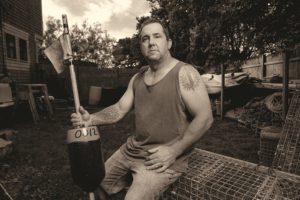MIKE REGO / LOBSTERMAN / PROVINCETOWN

Mike Rego sees the handwriting on the wall for lobstering out of Provincetown in the not too distant future. But for now, he’s in full stride, in love with what he does. And he’s part of a new breed of fishermen working with scientists to clean up abandoned gear and junk from the bottom of the harbor. Here’s Mike in his own words, recorded in 2020.
I grew up in Provincetown, fourth generation. Everybody was a fishing family, pretty much. You’d win baseball championships, and they’d throw parades for you down the street. Everybody knew who you were. If you were getting in trouble, by the time you got home, your parents already knew you were doing something bad. You couldn’t get away with anything here.
Back in probably the late ’60s, there were 70 boats fishing out of this harbor. You’d have boats five deep. It was cool watching it all develop, but by the time I was a junior in high school, you saw a lot of the older guys starting to get out. Fuel and everything else, maintenance on a boat, just got more and more expensive, and the price of fish stayed the same for years. My dad, being a fisherman, would tell me this is going to end badly.
I started seeing it, but to me it didn’t matter. That’s what I wanted to do. I just fell in love with the freedom of it. You are your own person out there, whether it was a bad day where you ripped the net all to pieces and you didn’t catch anything, or the days where there was so much fish in the boat you had to stop fishing and come home.
Once I graduated, I could get a job on almost any boat I wanted. I earned my right to become part of the gang. If you needed something, all those guys would have your back in a matter of minutes.
My grandfather was a draggerman. My father, he grew up a draggerman. You looked at the men back then. They were just all muscle. Their hands were like catchers’ mitts. They had a good life, and they made a lot of money. In this town, they made more money than people working at banks or anything else. Every captain had a house in Provincetown and owned their boat. Those were the guys. That’s who you looked up to.
I’m 46, and I’ve had my own boat now for 19 years. I would say lobstering is the most expensive fishery there is. If you have 800 pots, you’re well over $100,000 just in gear. I throw it out into the ocean and it could be gone tomorrow — a storm, somebody doesn’t like you. You go out and there’d be nothing left. And what do you do?
Everybody thinks you go lobstering, and you take your pots out of the water, that’s it. I’ll see you next season. Well, it isn’t. It’s 12 months out of the year, even though you’re not fishing, there’s three or four months of just nothing but gear work.
At the beginning of the season, everything’s painted, all new flags on the buoys. If I showed you a buoy when it first went in the water, you’d think, Oh, it’s really pretty! By the time January came around, they’re all furry and full of seaweed. You wouldn’t even recognize what it is.
About 10 years ago, Laura Ludwig from the Center for Coastal Studies approached me about grappling, which is towing a metal hook on the harbor bottom to recover debris, lost traps, and garbage. Back in the day, draggermen, scallopers, they’d get a bunch of old ghost traps, and they had a spot where they threw them all. You’re looking at 50 years, probably more, of people throwing stuff. It was overwhelming how much stuff we actually got, thousands and thousands of pounds — bicycles, gas grills, batteries. We’ve got toilets.
I think we’ve done a pretty good job over the years, ’cause now we go back to the places that we’ve gone to previous years, and it’s real hard to get something out of there.
I love doing it. I really like the science part of it. I’ve learned a lot. It kind of makes me feel satisfied, like I’ve gotten some stuff off the bottom of the ocean that doesn’t belong there.
My daughter’s 13, and she’s totally into the environment. She really likes that we’re trying to protect the ocean. In terms of fishing, I think it’s going to be hard for my daughter’s generation. I wouldn’t encourage her or any young people to get into it. I think we’re a dying breed all the way around. The way things are going right now, I would say in 10 years, you won’t have a lobsterman here, not in Provincetown. The handwriting is on the wall.
My daughter, Lillian, is a great artist. That’s where her heart’s at. I hope she goes that direction. I really do. She’s in a great place for it. It’s kind of what fishing was like back in the day, where you had a bunch of guys behind you saying, “You love it. Let’s go. Let’s do it!”
With the art community here, I think she has a great opportunity to have a lot of support and really succeed. She knows who she is and what she wants to do. That’s great. And it reminds me of myself, because when I was 13, I knew what I wanted to do.
Provincetown has always been art and fishing. That’s what made this whole town, for as far back as you can remember.



